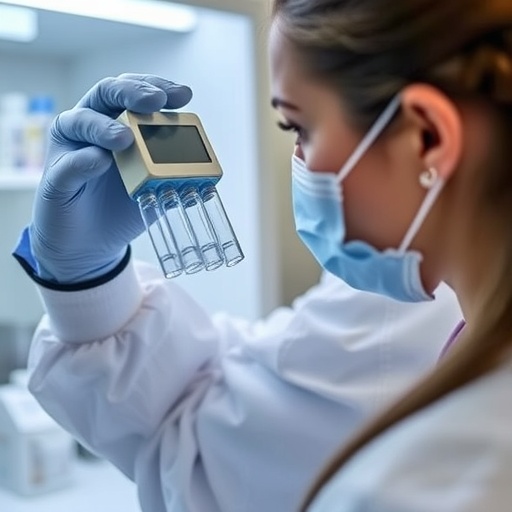The field of biopharmaceuticals is at the forefront of modern medicine, heralding a new era of treatment methodologies that leverage human-derived components to combat various diseases. Conventional chemically synthesized drugs have served humanity well, yet the emergence of biopharmaceuticals aims to refine this approach by utilizing biological materials that may offer improved efficacy and specificity in targeting diseases. However, despite their promising potential, biopharmaceuticals face significant challenges when it comes to ensuring their sterility and shelf life. The inherent characteristics of these human-derived molecules often render them unsuitable for terminal sterilization processes, which jeopardizes their safety and therapeutic effectiveness.
Traditionally, sterility testing methods for pharmaceuticals are lengthy and can take several days to weeks to deliver results. This extended period stands in stark contrast to the limited shelf life of many biopharmaceuticals, creating a pressing clinical dilemma. Many healthcare providers find themselves in the challenging position of administering these products to patients before receiving any confirmation regarding their sterility. Such practices not only place patients at risk but also raise considerable concerns among healthcare professionals regarding the balance between urgent treatment needs and the critical aspect of product safety.
In response to these pressing challenges, researchers have developed an innovative nanoparticle-based sterility testing method designed to ascertain the sterility of biopharmaceuticals within a single day. This advancement promises to significantly mitigate the clinical risks that arise from the use of biopharmaceuticals while maintaining therapeutic efficacy. By enabling rapid detection of microbial contamination, this technique could have profound implications for how biopharmaceuticals are managed and administered in clinical settings.
The core of this novel sterility testing approach is its utilization of synthetic beta-2-glycoprotein I peptides. These peptides are adept at selectively isolating and purifying a wide array of microorganisms, effectively enhancing the testing process’s capacity to identify potential contaminants. When implemented in a clinical setting, this step represents a breakthrough in the capacity to detect threats to product sterility quickly and efficiently. The peptide’s ability to broadly capture microbial entities places it at the center of a novel methodology that redefines existing sterility testing paradigms.
Complementing the peptide-based isolation steps is the use of a sophisticated microfluidic chip that facilitates real-time monitoring of the metabolic activities of isolated microorganisms. As these pathogens proliferate, they undergo metabolic changes that can be visualized through fluorescence imaging. This method relies on the reduction of a non-toxic dye to indicate the presence and metabolic activity of microbial populations, allowing for quick interpretation of results. This technology effectively transforms the traditional sterility testing model by incorporating real-time feedback and analysis, thereby enhancing the overall reliability of test outcomes.
In comparative analyses with conventional sterility testing methods, this new approach has demonstrated remarkable efficiency. Researchers reported a turnaround time reduced by greater than 58 hours while maintaining a 100% accuracy rate in detecting microbial presence. This improvement is especially critical in an age where the speed of diagnosis and treatment can directly influence patient outcomes. The newfound ability to detect contamination at concentrations as low as 1 colony-forming unit per milliliter further illustrates the assay’s sensitivity and potential for widespread clinical application.
Validation studies have underscored the robustness of this innovative approach, demonstrating its efficacy with various clinical-grade biopharmaceutical products. The comprehensive evaluation involved testing multiple formulations and conditions mimicking real-world scenarios, which confirmed the assay’s versatility. Given the rigors of regulatory environments and the necessity for stringent testing procedures, the ability to rapidly ascertain sterility is invaluable for manufacturers and regulators alike.
The implications of this rapid sterility test extend beyond operational efficiencies and into the realm of patient safety and public health. In scenarios where biopharmaceuticals are administered under time-sensitive designations, having a reliable sterility confirmation process becomes crucial. It fosters greater confidence among healthcare providers in using these advanced therapies, enabling them to focus on efficacy and outcomes without the looming concern of contamination.
The merger of synthetic biology with advanced diagnostic techniques like microfluidics epitomizes a new frontier in medical testing. As science and technology continue to evolve hand in hand, the creation of more sophisticated solutions for age-old problems becomes possible. The efforts of researchers in developing this nanoparticle-based enrichment method are emblematic of such innovations, providing a pathway towards safer use of biopharmaceuticals.
Furthermore, there is a growing recognition of the role that rapid testing plays in the broader context of drug development and quality assurance. As the pharmaceutical landscape shifts towards personalized medicine and tailored therapies, the demand for optimized sterility testing will only grow. Such developments can pave the way for changes in regulatory frameworks, potentially accelerating the approval processes for therapeutic products that are critical for patient care.
In conclusion, the unveiling of a one-day rapid sterility test for human-derived biopharmaceuticals marks a pivotal moment in the ongoing journey to enhance the safety and efficacy of these promising therapeutic agents. By harnessing the power of synthetic peptides and cutting-edge microfluidic technology, this innovation underscores the potential of interdisciplinary approaches in resolving complex medical challenges. As this method gains traction across clinical and regulatory realms, it may very well reshape the future landscape of biopharmaceuticals, enhancing patient safety and fostering the continued evolution of medicine.
Subject of Research: Rapid sterility testing for human-derived biopharmaceuticals
Article Title: One-day rapid sterility test for human-derived biopharmaceuticals
Article References:
Kang, J., Kim, H., Jang, H. et al. One-day rapid sterility test for human-derived biopharmaceuticals. Nat. Biomed. Eng (2025). https://doi.org/10.1038/s41551-025-01524-3
Image Credits: AI Generated
DOI:
Keywords: Biopharmaceuticals, sterility testing, nanoparticle-based method, synthetic peptides, microfluidics, patient safety, microbial detection, drug development, personalized medicine, fluorescence imaging.
Tags: accelerated sterility testing biopharmaceuticalsbalancing treatment urgency and product safetybiopharmaceuticals and terminal sterilization issueschallenges in biopharmaceutical safetyenhancing efficacy of biopharmaceutical treatmentsensuring sterility in human-derived drugsimproving shelf life of biopharmaceuticalsinnovative approaches to sterility testingmodern medicine and biopharmaceuticalsnanoparticle-based sterility solutionsone-day sterility testing methodsrapid sterility testing for pharmaceuticals





